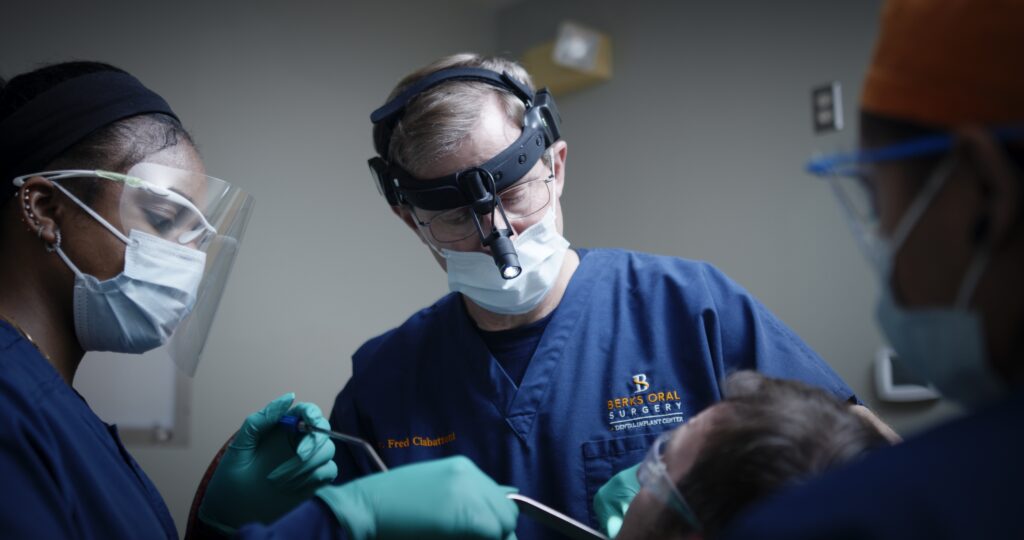Tooth extractions are often performed by oral and maxillofacial surgeons. Removal can be recommended for varying reasons, with each bringing potential complications. For example, teeth that are beyond restoration due to severe dental decay can be painful, less secure, infected, or abscessed; these problems create potential risks to the patient’s overall health.
Complications from decay are not the only reason people require this service. Removal can also be part of a comprehensive orthodontic treatment plan, with the removal addressing crowding or concerns about a malpositioned tooth. This can create space needed to either complete or start orthodontic work. Primary (baby) teeth may also be considered for removal as well, as they can be affected by dental decay and/or obstruct the eruption of secondary (adult) teeth.
Impacted teeth are often symptomatic or potentially problematic and are considered for removal. Wisdom teeth often experience this complication, but other teeth can be impacted, including any supernumerary (extra) teeth you have in your mouth.
Our doctors will be sure to discuss with you the indications, options, risks, and anesthetic options associated with your individual treatment plan. Your referring dentist’s or orthodontist’s treatment recommendations will be reviewed and confirmed as well.
Medication And Your Extraction
Some prescription medications will affect the tooth extraction process. Patients on anticoagulation therapy (Coumadin or Plavix) may need to temporarily adjust their prescription doses or schedules to prevent problems with postoperative bleeding. Patients with osteoporosis or other medical conditions requiring bisphosphonate therapy (Fosamax, Boniva, Actonel, Reclast) may require preextraction blood tests and alteration of their medication regimen to minimize postoperative complications, as these medications alter bone remodeling and can disrupt the healing process. Your doctor will discuss the management of these medications with you at your consultation.
For Preoperative Cardiac And Orthopedic Patients
Patients preparing for heart valve replacement surgery or joint replacement surgery should have a comprehensive dental exam prior to their proposed surgery, as these patients sometimes require dental extractions to limit infection risks to the prosthetic component.
On occasion, medical circumstances and time constraints make it necessary to perform dental extractions in a hospital setting. Our doctors are on staff at both the Reading Hospital and Saint Joseph Hospital, and they will coordinate your oral surgical needs with your cardiologist or orthopedic surgeon.
Preprosthetic Surgery
Preprosthetic surgery usually involves preparing the oral cavity for the placement of removable prosthetics (removable full or partial dentures). Depending on the condition of the patient’s surrounding bone and gum tissues, they may require surgical procedures beforehand to effectively support their denture.
The tooth supporting bone is referred to as alveolar bone, and the gum tissue as gingiva. An alveoplasty or alveolectomy involves the reshaping or removal of alveolar bone. This is done to remove undesirable contours, ridges, or sharp edges to provide a smoother, more comfortable foundation for a denture.
Alveolar bone procedures are often performed simultaneously with multiple tooth extractions but are sometimes delayed to allow for natural remodeling of bone to take place. Gingivoplasty procedures are performed to remove or reshape the gums to provide a more acceptable surface for a removable denture.
Lingual tori are deposits of excessive bone on the lingual (tongue) side of the lower jaw. They can vary in size, are usually bilateral (present on both sides of the lower jaw) and are somewhat bulbous in shape. Lingual tori will interfere with the lingual flange of a lower full denture and the lingual framework of a lower partial denture. The removal of this bone often takes place prior to the fabrication of lower removable dentures.
Similarly, a palatal torus is an overgrowth of excessive bone on the upper hard palate. Palatal tori interfere with the placement of upper full dentures and usually require removal or reduction prior to making the denture.
Tooth Extraction And PreProsthetic Surgery Are Available From Berks Oral Surgery
Tooth extractions are one of the most common procedures performed by oral surgeons, and Preprosthetic surgery is important for giving you long-term benefits from your prosthodontic work. If you would like to learn more, call Berks Oral Surgery today at 610-374-4093!

